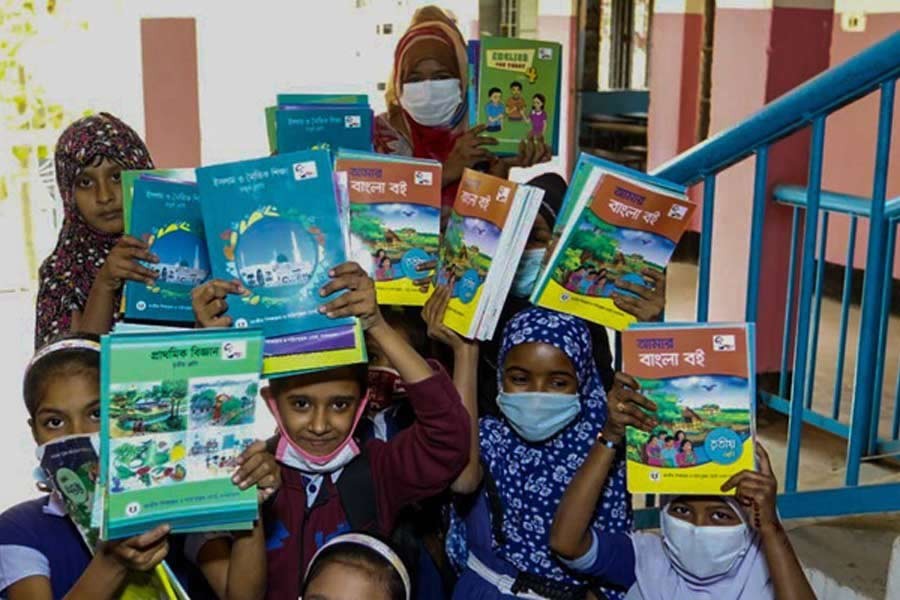As the world enters the 2nd year of the ongoing pandemic as well as shutdowns, it is the teenage school students who have now begun realising a bitter truth. It has now become evident to them that they have been caught in the maze of a terrible time. The last one year of school closures was filled with spaces for unfettered leisure and no pressure of curricular activities. With the pandemic shutdowns dragging on indefinitely, the educated parents in the underdeveloped countries entered their bouts of anxieties. These worries have had no parallel in the recent history. As the pandemic situations warranted preventive measures like shutdowns, the curfew-like lockdowns and the stringent health guideline of physical distance, many senior students were found overtaken by an unexplainable prescience. In the pandemic-hit poorer countries, lots of students began feeling being doomed.
The prolonged school closures have not spared many middle-grade students, with the insidious 'teenage boredom' creeping into their playful freedom enjoyed earlier. Education experts have found in this juvenile psychological ordeal the elders' ennui coupled with trauma. And it emerged as a worldwide phenomenon. With the school closures continuing amid fears of 2nd or 3rd round strikes of the pandemic, many affluent Western countries find themselves in a fix.The puzzling situation's domino effect is now set to afflict the Third World countries. Bangladesh falls among them.
In this fraught period, the curricular spectacles around the world have begun smacking of myriad types of dread. They are increasingly being detected in almost all the regions and countries of the world, irrespective of their socio-economic status. Upon making a broad appraisal of the global corona impacts on child education, UNICEF has come up with suggestions comprising urgent remedies. Unlike many other organisations, the United Nations Children's Fund wants to go straight for opening schools, where the Covid-19 prevalence has remarkably subsided. Its logic stands on the fact that despite the spectacular reduction in the pandemic's incidence, many countries seem reluctant to start normal academic functions at their schools. They want to still stick to the mode of distant learning, especially by taking recourse to online classes. The UN organisation rues the fact that in spite of the pronounced evidence of impacts of closures on school students and despite the fact that the pandemic is not sourced in schools, lots of countries still keep their schools closed. In cases, the closure is in place for nearly one year.
The UNICEF is clearly opposed to the present stance taken by many governments vis-à-vis their school closures. It doesn't hesitate to project a terrible scenario of child education in the near future. The cost of school closures, affecting 90 per cent of students worldwide at the peak of the pandemic lockdowns, was that it left more than a third of the school children without access to even remote education. As the worldwide spectacles have it, there are few developing and least developed countries which do not have to encounter the common picture of out-of-school children. Due to the long detachment from schools, children's ability to read, write and do basic math has undergone miserable jolts. As the UN agency has observed, the skills the children need to acquire to thrive in the 21st century era of economy have diminished. UNICEF has specially focused on the mid-day meals and many other safety nets coming from schools, in the absence of which the ultra-poor segments of students continue to grow apathy towards education at an early age. To many students, non-availability of these incentives results in their vulnerability to neglect, premature marriage, and almost inevitably, their engagement in child labour.
This is a common plight that awaits children during normal times in the poverty-stricken countries. After the global outbreak of Covid-19 which turned the socio-economic equilibriums upside down, child students made to remain at 'safe distance' from schools portend an insurmountable vacuum in the education sector. Amid this pervasive reality, Bangladesh has chosen its unique way of dealing with the pandemic-time child education. Its schools still remain closed, with no specific time of opening yet to be announced assertively. Although the pandemic's intensity has reduced, the country is yet to be free of it. It continues to raise its head. Moreover, the country's endeavours to reach out for vaccines go on unabated. Instead of being bewildered by the highly confounding situation, the government goes about its routine business. Instead of postponing the start of the schools' academic year on January 1, the government opened a long-awaited event. The day, like in the previous years, marked the distribution of free textbooks among all primary and secondary schools.
Normally, the Prime Minister of the country inaugurates the event in person. In the year of the pandemic, she has done the job virtually. A noticeable aspect of this year's distribution of free new books constituted the students' joy at receiving the books. As could be gleaned from many spectacles, with the books of the new academic calendar in hand the students became oblivious to the dreary atmosphere created by the Covid-19 pandemic. The euphoric moments were short-lived. The bitter truth of the schools' closure didn't take time to haunt them again.
In the Bangladesh context, the pandemic-time academic activities have not ground to a halt. Admission tests, holding of public exams, online classes, though on a limited scale, are in place. The nation cannot afford to let its students vanish into the cave of Hamelin. The UNICEF also favours going for school closures as a measure of last resort. But the educational authorities may not have the strength to see all the options exhausted. It is undeniable, majority of the children are haunted by scores of ordeals while out of their safe shelters in schools. Responsible governments cannot declare their schools open unless there are all-clear signs. In the meantime, repeated closures and reopening of schools are feared to go on. Few are oblivious to the fact that the world is passing through a terrible pandemic scourge.
shihabskr@ymail.com


